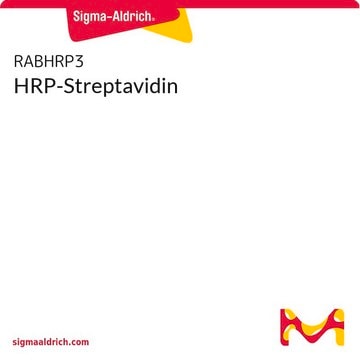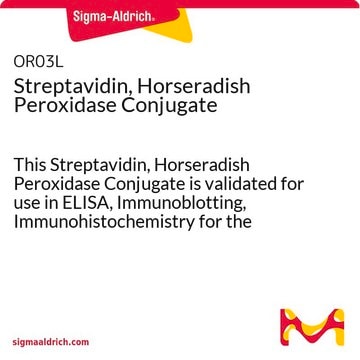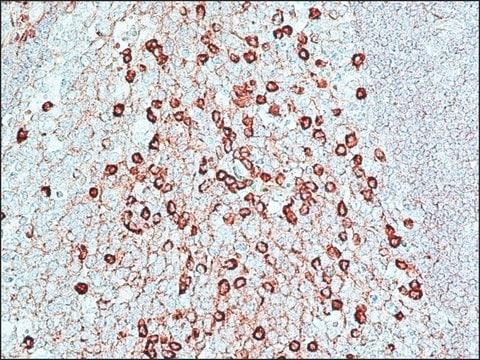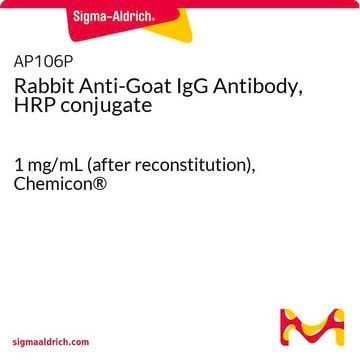B9265
Anti-Mouse IgM (μ-chain specific)–Biotin antibody produced in goat
affinity isolated antibody, buffered aqueous solution
Sign Into View Organizational & Contract Pricing
All Photos(1)
About This Item
Recommended Products
biological source
goat
Quality Level
conjugate
biotin conjugate
antibody form
affinity isolated antibody
antibody product type
secondary antibodies
clone
polyclonal
form
buffered aqueous solution
technique(s)
direct ELISA: 1:20,000
storage temp.
2-8°C
target post-translational modification
unmodified
General description
IgM is a glycoprotein antibody that regulates humoral immune responses. Mouse IgM is involved in modulating B cell memory . This antibody isotype has also been implicated in the development of autoimmune responses associated with the pathogenesis of type 1 diabetes in mice . Anti-Mouse IgM (μ-chain specific)-Biotin antibody is specific for mouse IgM when tested against mouse IgA, IgG, and IgM by ELISA.
Immunogen
Mouse IgM
Application
Anti-Mouse IgM (μ-chain specific)-Biotin antibody is suitable for use in immunocytochemistry (at 1:500 dilutions in methanol-fixed, sheep embryo sections) and direct ELISA (1:20,000).
Physical form
Solution in 0.01 M phosphate buffered saline pH 7.4, containing 1% bovine serum albumin and 15 mM sodium azide
Disclaimer
Unless otherwise stated in our catalog or other company documentation accompanying the product(s), our products are intended for research use only and are not to be used for any other purpose, which includes but is not limited to, unauthorized commercial uses, in vitro diagnostic uses, ex vivo or in vivo therapeutic uses or any type of consumption or application to humans or animals.
Not finding the right product?
Try our Product Selector Tool.
Storage Class Code
10 - Combustible liquids
WGK
WGK 3
Flash Point(F)
Not applicable
Flash Point(C)
Not applicable
Certificates of Analysis (COA)
Search for Certificates of Analysis (COA) by entering the products Lot/Batch Number. Lot and Batch Numbers can be found on a product’s label following the words ‘Lot’ or ‘Batch’.
Already Own This Product?
Find documentation for the products that you have recently purchased in the Document Library.
Customers Also Viewed
M Dattena et al.
Molecular reproduction and development, 73(1), 31-39 (2005-10-06)
This study was conducted to isolate, to culture, and to characterize embryonic cell lines from in vitro produced vitrified sheep blastocysts. Embryos were produced and vitrified at the expanded blastocyst stage. Ten inner cell masses arising from day 6-7 blastocysts
Christian Reichel et al.
Drug testing and analysis, 11(11-12), 1675-1697 (2019-11-24)
Follistatin, a myostatin-inhibiting protein, is prohibited according to chapter S4 of the "WADA 2019 List of Prohibited Substances and Methods". While currently no approved pharmaceutical formulations of follistatin are available, follistatin can be bought on the black market. Most of
Claude-Agnès Reynaud et al.
Cellular and molecular life sciences : CMLS, 69(10), 1625-1634 (2012-04-07)
Humoral memory is maintained by two types of persistent cells, memory B cells and plasma cells, which have different phenotypes and functions. Long-lived plasma cells can survive for a lifespan within a complex niche in the bone marrow and provide
J Côrte-Real et al.
Diabetologia, 55(6), 1761-1772 (2012-03-03)
We sought to determine whether the presence of natural autoreactive antibodies of B1a cell origin would play a role in the initiation of type 1 diabetes. We compared IgM repertoires and B1a cell compartments in NOD and C57BL/6 mice. Serum
Julie A Douthwaite et al.
mAbs, 7(1), 152-166 (2014-12-09)
Therapeutic monoclonal antibodies targeting G-protein-coupled receptors (GPCRs) are desirable for intervention in a wide range of disease processes. The discovery of such antibodies is challenging due to a lack of stability of many GPCRs as purified proteins. We describe here
Our team of scientists has experience in all areas of research including Life Science, Material Science, Chemical Synthesis, Chromatography, Analytical and many others.
Contact Technical Service









